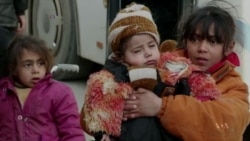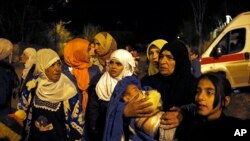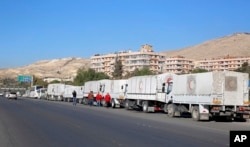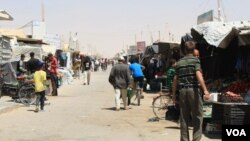Humanitarian groups say the partial cease-fire in Syria is an improvement, but the "cessation of hostilities" agreement needs stricter, sustained enforcement.
“While the recent agreement to cease hostilities represents important progress, it’s incumbent on everyone to double down and turn this agreement into a sustainable cease-fire,” said Neal Kenny-Guyer, CEO of Mercy Corps, which has been working in Syria, feeding about 570,000 people each month.
At a briefing Thursday in Washington, Kenny-Guyer said constant clashes, airstrikes and shelling on the ground continue, although at a much reduced level, which has allowed humanitarian organizations to reach areas that were previously inaccessible.
“[Wednesday], there were five airstrikes at the entrance to Aleppo city. Since Monday, there’ve been fighting and shelling in and around Aleppo, and the main road has been subject to intermittent closure. Yesterday [the road] was closed completely. There’s also clashes 15 kilometers from the Turkish border,” he said.
Kenny-Guyer said that suffering at the current level must not continue. “I’ve been engaged with almost every major humanitarian crisis since the killing fields of Cambodia, but still the scale and magnitude of the Syrian crisis, the suffering of ordinary civilians of children and mothers, continue to astound and shock me.”
While humanitarian assistance is sustaining some lives, it’s not the solution to the Syrian crisis. Ultimately, the solution is political, he said.
Bombing hospitals
Since the Russian intervention in Syria last year, a hospital there is hit or bombed every two days, according to a doctor who has just returned from a medical mission in the country.
Zaher Sahloul, head of the Syrian American Medical Society, a humanitarian organization, said that in the past year 75 percent of his group's medical centers were bombed, "And we lost many of our medical staff.... This is something we have to highlight, because it is not normal."
Sahloul cited the Geneva Conventions. "We have to respect doctors, nurses and medics. Even if, in the worst situation, they are providing health care to people perceived as the enemy, they should be protected and this is not happening in Syria.”
Neighboring countries
Oxfam International President Raymond Offenheiser said it’s important to think of Syria’s neighbors and the impact the war has had on them. They need investment fast if they are going to help support the millions of refugees pouring into their borders, he added.
“Lebanon and Jordan, which host nearly 2 million refugees, have spent the equivalent of nearly 7,000 percent of their fair share. In other words this is what they are spending of their national budgets as a share of the U.N. appeal to support the refugees that are actually present in their own countries,” he said.
According to Offenheiser, there also is enormous pressure on the school and health systems.
“Lebanon, for example, is hosting more than 1 million refugees. That’s about 30 percent of its population. Since January of last year, its borders have been effectively closed to refugees ... and Syrians who wish to obtain legal residency have now to sign a pledge they wouldn’t work or they have to find a Lebanese citizen to sponsor them,”
Offenheiser said in Turkey, which holds about 2 million Syrian refugees, some towns have seen their populations double, with still about 600,000 unregistered refugees inside the country.
Finally, he said in Jordan “more than 83 percent of its more than 600,000 Syrian refugees actually live outside the camps. So while we see the pictures of the Zaatari camps that’s not where most people actually are. They are in towns and cities all over Jordan.”
Offenheiser called it the "biggest humanitarian crisis since World War II, and I think we have to imprint that in our minds and realize the seriousness of the crisis and the scale of it.”








